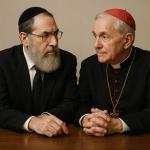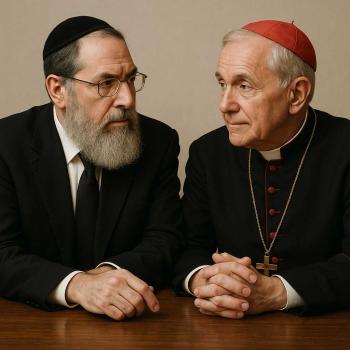
In my last post, I explained what the idea of the Jews being a chosen people means to me, guided by the biblical texts and later Jewish philosophers. In this post, I want to talk about how Catholics understand Jewish chosenness.
In broad strokes, for over a thousand years, the universally accepted Christian doctrine was that the Jewish people, while once chosen, lost that special status after rejecting Jesus. Since then, Jews have been exiled and cursed and forfeited their covenant. In their stead, Christians have become the “new Israel.” Galatians 3:28 puts it this way:
“If you belong to Christ, then you are Abraham’s seed, and heirs according to the promise.”
In other words, after the coming of Christ, believing in Jesus became the new definition of being a Jew. So it follows that the Jews who continued to follow Old Testament law, rejecting Jesus, were replaced by the Church in regards to being the chosen people of God.
In a classic formulation, the early church father Melito (writing in the 200s C.E.) wrote that “the law was fulfilled when the gospel was brought to light, and the people (of Israel) lost their significance when the church came on the scene.”
This type of language is found all over the writings of the earliest church fathers like Melito and St. Augustine, medieval theologians like St. Thomas Aquinas), and popes of every century.
Fast forward to 1904 and Pope Pius IX sounded pretty similar to Melito when he responded to Theodore Herzl’s request for support of a future Jewish state in Israel by saying:
“The Jews have not recognized our Lord, therefore we cannot recognize the Jewish people.”
Thus, for about 1,700 years, the de facto position of Catholics and Protestants was that the Jews are no longer a chosen people. In their defense, it has a certain logic to it: if following the laws of the Old Testament no longer provides salvation —“a person is not justified by the works of the law, but by faith in Jesus Christ” (Galatians 2:16)—then the people of that Old Covenant are no longer special by virtue of following that law.
Put differently, If the old law is out, then the old people must be out too. Makes sense, right?
We’ll get back to that argument later.

Historically, however, the Catholic Church completely reversed herself on this issue in 1965, with the release of Nostra Aetate.
In that pivotal document, Catholics began to inch closer to accepting the idea that the Jews have in fact remained the chosen people after all, even after they rejected Jesus.
One revealing line from Nostra Aetate signals this shift:
“Nevertheless, God holds the Jews most dear for the sake of their Fathers; He does not repent of the gifts He makes or of the calls He issues-such is the witness of the Apostle.”
This line paraphrases an important verse from the New Testament about the eternal nature of the Jewish people and their covenant. Paul says about the Jews:
“As regards the gospel they are enemies of God, for your sake; but as regards election they are beloved for the sake of their forefathers. For the gifts and the call of God are irrevocable (Romans 11:28-29).”
In other words, because God chose the Jews way back when, He can never take that choice back, and so they remain eternally chosen.
Another line from Paul’s Letter to the Romans is even more explicit about Jewish chosenness:
“Theirs is the sonship and the glory and the covenants and the law and the worship and the promises… (Romans 9:4-5).”
So the Church changed her mind about Jewish chosenness, but her “new” viewpoint is actually found in Paul’s Letters; Nostra Aetate was simply returning to scripture! And this old-new, scripturally inspired position asserts that the Jews remain chosen by God, their covenant with Him being eternal.
Pope John Paul II said this succinctly in an important speech in 1980 addressed to German Jews, calling them the “people of god of the Old Covenant, which has never been revoked.”
Zooming decades ahead to the year 2015, the Pontifical Commission on Religious Relations with the Jews released a document on Catholic Jewish relations. Although it isn’t an “official” church teaching, it contains some remarkable language about the Jews. Here is a critical paragraph:
“The Church is the definitive and unsurpassable locus of the salvific action of God. This however does not mean that Israel as the people of God has been repudiated or has lost its mission (cf. “Nostra aetate”, No.4). The New Covenant for Christians is therefore neither the annulment nor the replacement, but the fulfillment of the promises of the Old Covenant…God entrusted Israel with a unique mission, and He does not bring his mysterious plan of salvation for all peoples (cf. 1 Tim 2:4) to fulfilment without drawing into it his “first-born son” (Ex 4:22).”
Great! The Jews are still the chosen people of God, and even have a unique mission to bring about salvation for the whole world. That sounds pretty in line with the Old Testament covenant and promises.
However, this paragraph also raises a contradiction, which comes about from the logic of replacement theology that I mentioned earlier.
If indeed the Church is the definitive locus of God’s salvation, then how can the Jews still be considered chosen? The “New Covenant” of Jesus is for all peoples, and fulfills Old Testament law by replacing it with grace. Why would God still need a chosen people anymore if “there is neither Jew nor Gentile, neither slave nor free… for you are all one in Christ Jesus (Galatians 3:28)?”
That’s actually such a great question that the Commission throws its hands up and says that the Jewish role in God’s salvation is an “unfathomable divine mystery.” Because indeed, how could a people reject Jesus as savior and STILL be the chosen people with a unique mission from God?
This post will end with that question, because the Catholic Church has not yet arrived at an answer. I’m happy that the Church now acknowledges that the Jews are a people with a special divine purpose. It’s certainly better than Melito saying the Jewish people are a “thing without value!”
But I’m left unsatisfied with how the Church ends up defining the role of the Jews. My last pos showed how the Old Testament sets up Israel as a model nation to educate the world about justice, righteousness, and fearing God. But for Catholics and all Christians who believe that
A. Jesus is “the way and the truth and the life” (John 14:6), and
B. regard Old Testament law as ‘fulfilled’ through Christ,
what use should God have for a people that
A. rejected His Son and
B. continues to follow the Law, which has been replaced by grace?
I don’t know. Maybe Paul had it right all along:
“Oh, the depth of the riches of the wisdom and knowledge of God!
How unsearchable his judgments,
and his paths beyond tracing out!”
(Romans 11:33-34)
















